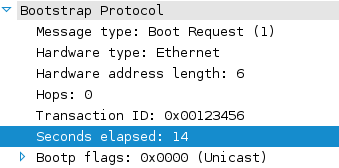This error indicates that DHCP has timed out without receiving a response from a DHCP server.
Things to try:
- Check that your DHCP server is online and responding to requests.
- Check your DHCP server logs. For example, if you are using ISC dhcpd, you should see something like
dhcpd: DHCPDISCOVER from 00:18:f3:f0:9e:61 via eth0 dhcpd: DHCPOFFER on 10.0.0.171 to 00:18:f3:f0:9e:61 via eth0 dhcpd: DHCPREQUEST for 10.0.0.171 (10.0.0.6) from 00:18:f3:f0:9e:61 via eth0 dhcpd: DHCPACK on 10.0.0.171 to 00:18:f3:f0:9e:61 via eth0
- Watch traffic on the DHCP server in real time
tcpdump -i eth0
- After the failed DHCP attempt, check the output from the
ifstatcommand to see if iPXE is receiving any packets (the “RX” counter) or experiencing receive errors (the “RXE” counter).
- Try configuring an appropriate static IP address on the iPXE client, using the iPXE command line. For example, to configure the static IP address 10.0.0.199/255.255.255.0:
ifopen net0 set net0/ip 10.0.0.199 set net0/netmask 255.255.255.0Check that you can
pingthis IP address from your DHCP server.
- If you are using Cisco networking equipment, then verify that portfast is enabled.
- If you are using iPXE inside a virtual machine with a bridged network, then you must set the bridge spanning tree interface startup forwarding delay to zero (Normally 15 seconds). You can do this using the command
brctl setfd br0 0
You may be able to configure this permanently via your system's network configuration files; e.g. by adding
DELAY=0to/etc/sysconfig/network-scripts/ifcfg-br0(Redhat). On some systems the minimum delay is 2 seconds.
- If your VM bridge network doesn't have multiple routes, then you may not need STP at all, in which case set
bridge_stp off
in
/etc/network/interfaces(Debian).
Advanced troubleshooting
You can use a packet trace to determine which types of DHCPOFFER have been received by looking at the “seconds elapsed” field in any DHCP packets transmitted by iPXE:
| Bit 0 | Indicates that a DHCPOFFER containing PXE options has been received |
|---|---|
| Bit 1 | Indicates that a DHCPOFFER containing an IP address has been received |
For example, suppose that the packet trace shows a DHCPDISCOVER containing:
The “seconds elapsed” value in this example is 14, which is 0b1110 in binary. Bit 1 is set, indicating that a DHCPOFFER containing an IP address has been received. Bit 0 is not set, indicating that no DHCPOFFER containing PXE options has been received.

